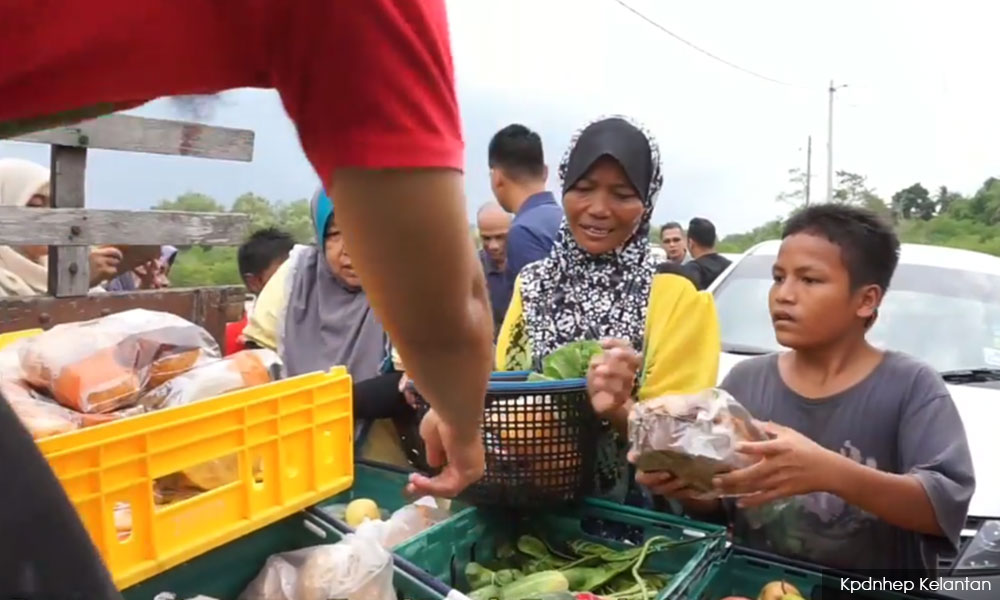The government is confident that the Food Bank Malaysia Programme (FBMP) can lighten the impact of the rising cost of living on the populace and reduce food wastage.
Prime Minister Dr Mahathir Mohamad said the implementation of the FBMP, to be headed by the Domestic Trade and Consumer Affairs Ministry, was timely with the focus of the government to lighten the burden in the cost of living of the people especially the B40 (lower income) group.
‘’This group must be given full attention to enable them to get access to (cheaper) food supply. This will boost their disposable income which can be used for education and health,’’ he said at the launching of the national-level FBMP at Kompleks Masyarakat Penyayang in George Town today.
The text of his speech was read out by Finance Minister Lim Guan Eng.
Mahathir said the initiative was a voluntary effort which did not have a large financial implication to the government.
‘’This initiative can be implemented via a high social responsibility commitment and voluntary spirit in the private sector and NGOs to together help the government in tackling the issue of food wastage and cost of living,’’ he said.
The issue of surplus food, according to the prime minister, was not a strange matter to Malaysia as its people produced 15,000 tonnes of excess food a day, of which 3,000 tonnes were safe for consumption.
"Almost two million people can benefit from the 3,000 tonnes of excess food if it can be distributed optimally. The issue of surplus food may appear trivial but it has a huge impact on the needy."
Mahathir said that he was told that via FBMP the surplus food would be channelled to the target groups and registered welfare homes.
"I was also told that FBMP will target 186,354 households which are below the poverty line nationwide to receive the surplus food," he said.
To ensure a more systematic and orderly management of the surplus food and implementation of FBMP, Mahathir said the government had agreed to launch a foundation which would be known as the Food Bank Malaysia Foundation.
"This foundation will become the catalyst in the effort of the government to reduce food wastage and tackle the issue of rising cost of living and will be headed by trustees comprising those with experience and committed in implementing successfully the government agenda," he said.
He also hoped that with the completion of all mechanisms of operation of its implementation, FBMP could be successfully mobilised to help all needy groups not only in Peninsular Malaysia but also in the interiors of Sabah and Sarawak.
"I also take this opportunity to once again call on all quarters especially corporate bodies, NGOs and individuals to be with the government in making FBMP a success," he said.
Special FBMP law
Domestic Trade and Consumer Affairs Minister Saifuddin Nasution Ismail said, meanwhile, that Putrajaya intends to create a special law to protect contributors and also recipients of the FBMP by the end of next year.
According to Saifuddin, this had been raised in the cabinet and the target was to table the law in parliament by the end of 2019.
He said the programme would be implemented nationwide from January next year which would run simultaneously with the formulation of the law to protect not only aid recipients, but also the contributors.
"But before the process of formulating the law, we must study the experiences of nations such as France, United Kingdom, United States, Australia, South Africa and Singapore because they have implemented such a programme.
"In adopting the experiences of other countries, we must also have our own local mould," he said after the launching of FBMP at the Komplek Masyarakat Penyayang here today.
Saifuddin, who is also Pantai Jerejak assemblyperson, said that among the components of a local mould which must be focused on was halal food from hotels.
"The elements of the law must encompass all aspects and halal food is a sensitive matter and must be taken seriously to prevent any problem from arising," he said.
"For example, now international brands who become contributors are worried that if they contribute and there is a slight flaw which results in the end user encountering a problem, they will be exposed to legal action.
"So, we have to scrutinise all aspects like that so that all the fears are answered after the new law is tabled," he said.
- Bernama



